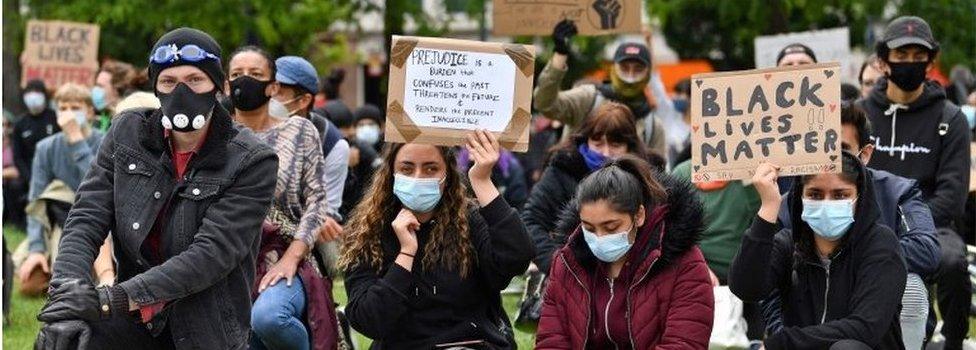Charity boss Tony Sewell to head government race commission
- Published
Dr Tony Sewell on heading UK race commission
The government has named Tony Sewell as chair of its new commission looking into race disparity in the UK.
The formation of the body was announced in June by Boris Johnson in the wake of anti-racism protests following the death of George Floyd.
Mr Sewell said the commission would "seek to inform a national conversation about race, led by the evidence".
But the Muslim Council of Britain said he was the wrong choice as he was "keen on downplaying race disparities".
The prime minister said Mr Sewell shared his "commitment to maximising opportunity for all".
The commission is tasked with looking at all aspects of inequality, including criminal justice, education, employment and health.
It will report back directly to Mr Johnson with its findings by the end of the year.
But Labour's shadow women and equalities secretary, Marsha de Cordova, said most of the evidence the commission would examine had already come to light in previous reviews on race, calling for "action on the structural racism that we already know exists" as a priority.
The Liberal Democrat's equalities spokeswoman, Christine Jardine, also called for the PM to ensure any recommendations from the commission "don't just sit and gather dust".
Now the boss of education charity Generating Genius, Mr Sewell worked with the PM in 2013 when he was Mayor of London, leading his education inquiry into the capital's schools, and sat on the Windrush working group.
He is a longstanding commentator on racial issues and education, attracting criticism from some quarters for his views, such as claiming boys were being failed by schools because lessons had become too "feminised", external.
He also said an anti-intellectual Afro-Caribbean youth culture, external was one of the reasons girls performed better than boys in school.
And, writing in Prospect magazine in 2010, external, he said "much of the supposed evidence of institutional racism is flimsy".
The BBC's community affairs correspondent, Rianna Croxford, reported that he was understood to be in line for the role earlier on Thursday.
After the appointment was confirmed, Mr Sewell said: "I have spent my entire career in education striving to help all students achieve their full potential.
"I know however that inequality exists, and I am committed to working with my fellow commissioners to understand why."

Commissioner needs community support

The commission was announced following Black Lives Matter protests held across the UK
Analysis by BBC political correspondent Leila Nathoo
This commission had its sceptics from the moment it was announced.
Some opposition MPs and organisations working on race equality were uneasy about Boris Johnson's comments that he wanted to "change the narrative" on race and "stop a sense of victimisation and discrimination".
There was also concern one of the prime minister's closest aides, Munira Mirza, who's been overseeing the setting up of the commission, had previously questioned whether structural racism existed.
Tony Sewell, who's now been chosen as chair, has written in support of both of these views.
As Downing Street was working to recruit the commission's members, I understand that a number of prominent figures in the black community - who did not want to be identified publicly - sought to distance themselves from the process.
Sources said some who'd been reluctant to pursue discussions with the government regarded the commission as "toxic" and a way for ministers to "play for time" or "pay lip service" to the idea of race equality.
A government spokesperson said: "It is untrue to suggest that a number of prominent Black individuals have rejected the opportunity to be a part of the commission."
The choice is sure to be a controversial one but it's clear the government wants to make a break from what has come before.
The Equalities Minister, Kemi Badenoch, said the commission will "inform and improve" the conversation about race - but the question will be, how much it can achieve if it doesn't have the full support of the communities its working to help?

The commission will face high levels of scrutiny after accusations another government review into race is a distraction from the issue.
The other members confirmed for the commission are:
Dr Maggie Aderin-Pocock - scientist and co-presenter of BBC's The Sky at Night
Keith Fraser - chair of the Youth Justice Board for England and Wales
Dr Samir Shah - CEO of Juniper TV, former BBC journalist and former chair of The Runnymede Trust
Lord Ajay Kakkar - Professor of Surgery at University College London
Dr Dambisa Moyo - international economist and author
Martyn Oliver - CEO of Outwood Grange Academies Trust
Naureen Khalid - co-founder of online national school governor forum UkGovChat
Aftab Chughtai - co-founder of the campaign group Muslims for Britain, member of the Grenfell Tower Taskforce and chair of West Midlands Police Independent Advisory Group
Mercy Muroki - senior policy researcher and columnist.
A spokesman for the Muslim Council of Britain condemned the appointments, saying: "The composition of the government's commission on race disparities sends a strong signal about its intentions. Many are partisans of a culture war keen on downplaying race disparities.
"Tony Sewell's appointment clearly demonstrates this. The composition of this commission tells us that the government intends to row back on previous work to tackle racial disparities."
Speaking to BBC News, Mr Sewell said he did believe "racism exists in structures", but added: "I do think some of the disparities there may not have origins in race. They could be rooted in class, different geographies, or different powers.
"We need to examine that... and take an intellectually wider view of this, rather than a narrow view."